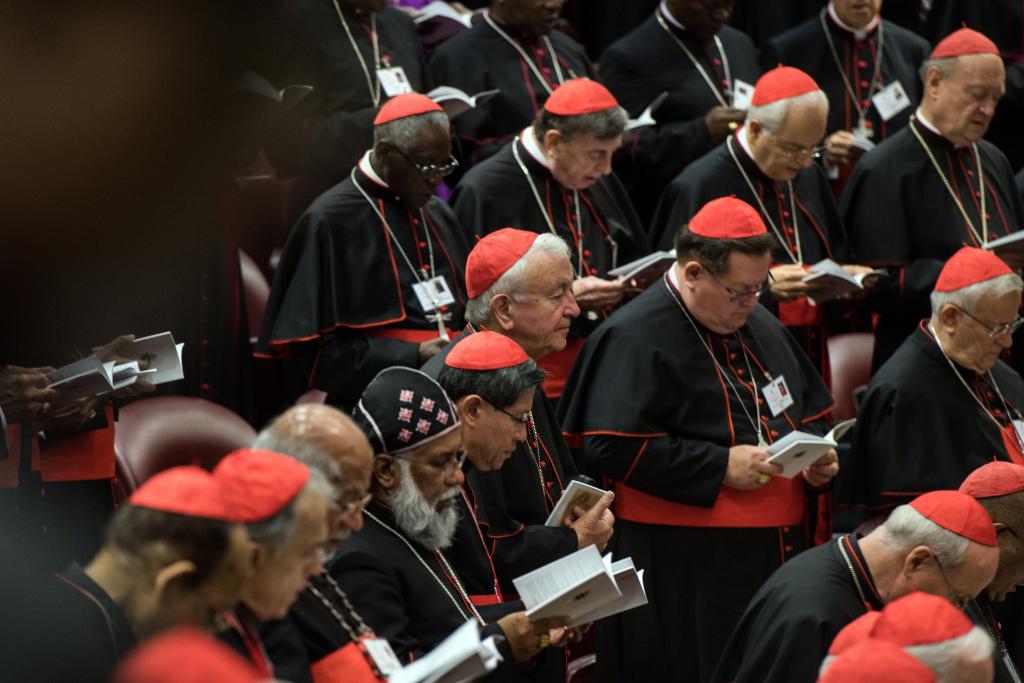In his intervention at the Synod on Youth, Faith and Vocational Discernment, Cardinal Vincent chose to address the ‘crushing poverty faced by young people in the world and the consequent dangerous journeys they undertake in search of prosperity elsewhere’.
Noting that these pressures lead to the ‘horrific crime of modern day slavery and human trafficking,’ he explained that every country represented at the synod is ‘a country from which vulnerable people are taken into slavery and into which the victims of human trafficking arrive’.
He said that the Catholic Church, as a ‘vast, international network committed to all that is good and just,’ has ‘a crucial part to play’ in the fight against human trafficking. He paid tribute to all in the Church, ‘especially many, many religious women who risk their safety to work with the victims of human trafficking’.
Sharing the work of the Santa Marta Group, which brings together the Church, governments and law enforcement agencies from around the world, the Cardinal explained that in all its work, ‘the victim is always at the centre of our efforts. So too are attempts to provide resources and opportunities that might prevent young people leaving their homeland and risking slavery.’ Such initiatives include projects in education and agriculture in Edo State in Nigeria, launched in conjunction with Dioceses of Benin and Uromi.
The Cardinal expressed the hope that ‘this topic of human trafficking, so crucial to millions of young people today, finds its place in our final [synod] document’. The German language group of synod delegates echoed that sentiment as they called for the text of the Cardinal’s entire intervention to be included in the final synod document.
The full text of the intervention follows.
Intervention of Cardinal Vincent Nichols
On para 155 of the Instrumentum Laboris
18 October 2018
Holy Father, my brothers and sisters,
I would like to follow and build on the comments we have heard about the crushing poverty faced by young people in the world and the consequent dangerous journeys they undertake in search of prosperity elsewhere.
These factors lead to the horrific crime of modern day slavery and human trafficking.
It is estimated that in the world today there are over 40 million people held in slavery. Forty million! And the vast majority of those are young people. This is, in the words of Pope Francis, 'an open wound in the body of humanity', in fact, 'in the body of Christ'.
Human trafficking touches us all. Every country represented in this Aula is a country from which vulnerable people are taken into slavery and into which the victims of human trafficking arrive. I first became aware of this when I listened to a young English woman who was trafficked from England into enforced prostitution in Italy; and when I heard an Afghan woman speak of being held in domestic slavery for 30 years in London, where her only place of privacy was under the kitchen table, where she was permitted to sleep. Children, in forced labour in central Africa, dig out of the earth, with their bare hands, the cobalt used to manufacture the batteries of the mobile phones in our pockets.
In the fight against human trafficking the Catholic Church has a crucial part to play. Human trafficking is a vast, international criminal network. The Catholic Church is a vast, international network committed to all that is good and just. I want to pay tribute, therefore, to all in the Church who help in this struggle, especially many, many religious women who risk their safety to work with the victims of human trafficking.
Also in our Church is the Santa Marta Group, started by Pope Francis, which brings together the resources of the Catholic Church and the leadership of law enforcement agencies, the police, from many different countries around the world. This is a crucial partnership which has the rescuing and support of victims and the prosecution of criminals at its heart. The work of the Santa Marta Group is growing, with a regional conference taking place in Nigeria in November and another in Argentina in February. I ask your support in these initiatives.
The victim is always at the centre of our efforts. So too are attempts to provide resources and opportunities that might prevent young people leaving their homelands and risking slavery. At present we have projects in education and agriculture in Edo State, in Nigeria.
I hope that this topic of human trafficking, so crucial to millions of young people today, finds its place in our final document and that this important work can go from strength to strength. May St Josephine Bakhita, the young Sudanese woman sold into slavery and now our Patron Saint, pray for us and bring God's blessing on these efforts.
Thank you.




